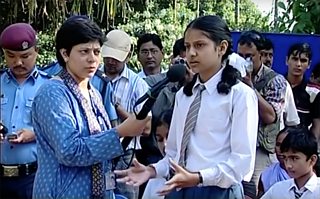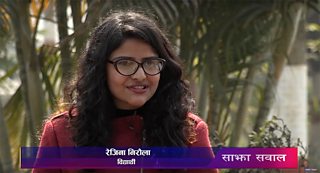Women making history in Nepal - the story of Sajha Sawal
Pratibha Tuladhar
Senior Producer/Stakeholder Liaison, Βι¶ΉΤΌΕΔ Media Action, Nepal
As Sajha Sawal (Common Questions) takes a break, we revisit the questions and answers that changed lives - and the evolution of the most-watched debate show in Nepal. By its last episode, the programme had reached out to 6.6 million viewers.
In 2008 Nepal was emerging from a decade-long civil war and entering a new political era. Sajha Sawal (Common Questions) - a Question Time-style debate show - found a ready audience that was used to dealing with volatile political circumstances.
One of the first questions came from a schoolgirl Rejina Niraula.
"The first right of children is to be able to go to school and study. But daily strikes and protests have affected our education. When will this situation end?" she asked of the then prime minister, the late Girija Prasad Koirala. Koirala had led the "people's protests" earlier that year, demanding an end to the monarchy, a written constitution and greater power to the people.

Rejina's question heralded change for Nepal and the future of Sajha Sawal. It set a precedent of questioning those in power, and challenging a deep-set status quo.
In Nepal where media and politics were (and still remain) a confrontational arena, presenter Narayan Shrestha helped change the political culture by calmly putting tough questions to those in power.
Female first
Five years later, a new presenter, Bidhya Chapagain took things up a notch - and as the new face of Sajha Sawal - she drove home the idea that female journalists could and should lead political dialogue. Taking centre stage in political debate - a largely male-dominated field - Bidhya helped set the course for Sajha Sawal to become the most watched debate show in the country.
The programme travelled across the country, asking questions and tackling significant issues. Bidhya shared huts with families in Tarai districts in sweltering summer heat, slept in freezing cold shacks with earthquake-affected families and shared modest meals with farmers on the mountains.
From that first question from Rejina, it has been a powerful platform for stories about women, who refused to give up regardless of what life threw at them.
There were stories of violence, of rape, of condemnation, of hurdles, of grief. But also, incredible stories about refusing to give up, resilience and choosing life over everything else.
This was the essence of Sajha Sawal for me, as a producer: the storytelling of women by women.
By women for women
Here are my stand-out moments:
- When senior journalist, Rama Parajuli, of Βι¶ΉΤΌΕΔ Nepali, conducted a debate on why so few women were elected in the recent elections.
- When Sweta Sinha, from our media partner, Kantipur TV, visited the flood victims of Saptari, in an episode about the impact of the cold wave.
- When, switching briefly from my producer's role to presenting, I conducted a walk-through Kathmandu with the indigenous community in order to discuss urban poverty. It was opportunity to visit lives that are often brushed aside by high-sounding political rhetoric.
And that's the beauty of Sajha Sawal. It gave the audience a chance to think, while prompting discussions and actions about issues that are frequently forgotten in the rush of mainstream media, and helped barriers to be broken.
It's empowered everyone, including me. When a male politician told me he would like to take a 'selfie' with me to prove he was providing me security- the way men in patriarchal Nepali society often think- I told him calmly but firmly, that I did not need his protection.
Knowing that you are equal with the male members of your society - is a contribution the show has made subtly to so many women in Nepali society.
No answers without questions
As Sajha Sawal takes a break - after a decade of broadcasting - we took a moment to catch up with the schoolgirl who asked a question in our first episode. But this time Regina is a soon-to-be-qualified doctor.

She appeared on the panel, sharing the stage with two prominent politicians and the presenter, Geeta Dhungana of Sajha Sawal's local partner, Himshikhar TV. It was inspiring to see Regina firing off questions about the future of country and the health facilities available to citizens.
And for Presenter Geeta, appearing on national television for the first time - albeit in the closing episode - it was an opportunity to call on the politicians to live up to the promises made in the past.
While slightly heavy in our hearts about the fact our show is taking a bow, the team are proud we've created opportunities and a platform for so many women to have their voices heard.
We look now to the future of Nepal and I, for one, hope that it holds a new season of storytelling by women, for women. We've come too far.
